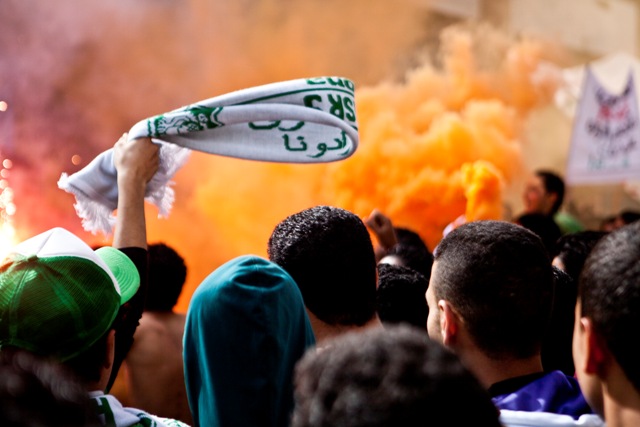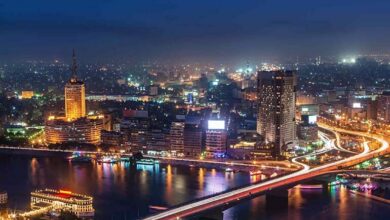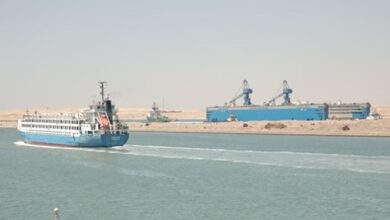
Egypt awaits today the verdict of Sobhy Abdel Hamid, the head of the Port Said Criminal Court who is to decide the fate of 73 suspects accused of killing 72 football ultras after a match played last year turned violent.
The verdict follows a week of clashes between police and protesters in several cities, including Port Said, which has erupted in anger when an earlier verdict last January in the same case gave the death penalty to 21 of its youths, who were suspects in the case.
The people of Port Said charge the government of President Mohamed Morsy of scapegoating them in the case by accusing the fans of their main football team, Masry, of killing Cairo’s Ahly fans after the match played between the two clubs. They say that in order to please the densely populated Cairo and its Ahly ultras, Morsy had to sacrifice Port Said, which is less relevant electorally for him.
But the anger in Port Said has extended to several other cities in the Delta, most notably, Daqahliya and Gharbiya, as well as Cairo, where clashes between police and protesters rose in the wake of anti-regime protests. These clashes have perturbed the stability of the security apparatus, with wide-scale protests taking place in the ranks of the Central Security Forces, strikes in several police stations and a complete withdrawal of the security from several areas, including the whole of Port Said. Protesting soldiers and officers have been calling for the resignation of Minister of Interior Mohamed Ibrahim, for implicating the security apparatus in the political scene.
The Port Said massacre case falls right in the midst of this contention.
Nine of the suspects in the case are policemen. They include Essam Samak, the former head of the Port Said security directorate, as well as the former heads of the National Security Agency and the Central Security Forces in the governorate. The nine suspects were not included in the death penalty verdict of last January, which is still being examined by the grand mufti, a standard procedure with executions here.
Shawqy Allam, the newly elected mufti, refrained from submitting his decision on the death penalty to the court, claiming that he didn’t have enough time to study the case sufficiently. This may lead to the postponement of today’s verdict, which is ripe with contentions.
“The case has been confusing from the beginning, and all the evidence can have different faces. But the angry political street and the security instability cannot bear a ruling less than satisfactory for all parties,” said Tarek Khedr, head of the Constitutional Law Department in the Police Academy.
He argued that if policemen are given tough sentences, this may further exacerbate the mounting anger within the security apparatus and contribute to policemen further losing their self-confidence and ability to do their jobs. If they are not, the ultras of Ahly, whose co-fans are the victims of the massacre, have threatened of retaliation by spreading chaos in Cairo and beyond.
The lawyers representing the families of the victims insist that the policemen were implicated in the case beyond just failing to stop the massacre. In the prosecution’s investigation, it was found that one of the accused policemen, Mohamed Saad, who was on duty at the stadium when the massacre happened, had closed the emergency door of the stadium from the side where the Ahly ultras were sitting, right before the match ended. This has prevented them from running away when the Masry ultras started attacking them.
Moreover, Ahmad Abdallah, former governor of Port Said, said that when Samak and his collaborators were asked about the security plan for the match, especially that it was taking place after constant fighting on online social media pages between the two fan groups, their answer was that everything was under control and that there was no need to cancel the match.
Mohamed Homos, one of the witnesses in the case, and the head of Samak’s office, said that some people showed up at the Security Directorate in Port Said six days ahead of the match and told policemen there that the Masry fans were planning an attack on Ahly fans.
That said, Ashraf al-Ezaby, one of the Port Said lawyers representing the defendants, reiterated that nothing was found in the prosecution’s investigation that could indict the policemen in the case.
“The evidence of the prosecution is weak. And the ruling that was issued for 21 defendants is sheer fear from the anger of Ahly’s ultras against the regime. At the end of the day, this ruling can be appealed which means that the case is far from over. And although the people of Port Said don’t care much about the fate of the policemen in the case, their legal status is not as bad as many think,” Ezaby said.
“The only weakness in the case of the policemen is that the match took place that day in the midst of popular anger. But this is not enough to incriminate them. And legally, this translates into neglect, which punishment is prison and not the death penalty,” he added.
But for the Ahly ultras, the demand is for “justice against all those who planned the massacre and deceived the people.”
Three scenarios were announced by Ahly ultras on their Facebook pages regarding today’s ruling. If the acceptable verdicts are issued against the policemen, Egypt will celebrate, they said. If the ruling is postponed, Egypt will go through a series of acts of instability, including roads and bridges’ blocking and closing down of public agencies. If the policemen are found innocent, then the Ministry of Interior will be invaded and burned including all those inside it.
For Ahmad Meshaly, a lieutenant and former spokesperson for the Coalition of Police Officers, it is unacceptable that the Ministry of Interior pays the price for a judicial ruling.
“It is impossible that the security apparatus pays the price of a ruling against some policemen. The former minister of interior who was in office during the massacre is equally responsible. This is about political responsibility,” he said.
“The situation won’t stabilize this way. Leave the police alone. It can’t keep paying the price for the failures of the ruling regimes' political management.”




